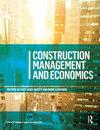Task planning and control in construction: revealing workers as early and late planners
IF 3.3
Q2 BUSINESS
引用次数: 0
Abstract
Production planning and control are critical to project success. They are conventionally understood as linking planning and production by coordinating tasks prior to installation work. However, research has highlighted workers as autonomous and decentralized planners of installation work, which challenges conventional management perspectives. Performing task-level planning and control requires resources and effort, reducing the time spent on installation work. This study explores workers’ planning practices by examining the use of higher-level plans and other information sources and by analyzing workers’ information needs and the factors determining them. A survey of Finnish construction workers was conducted. The results show that some workers prefer planning tasks before arriving at the construction site, while others prefer planning tasks during on-site work preparation. Trade- and crew-specific factors influence planning earlier or later and determine the extent to which centralized and decentralized sources and practices are used. Decentralized sources and practices are most often used to meet workers’ information needs, although centralized sources and practices are also used. These findings may help construction stakeholders better understand the information sources and practices used by workers. Thus, task planning and control activities can better meet workers’ information needs, allowing for more time for installation work.施工中的任务规划与控制:揭示工人的早、晚计划者
生产计划和控制是项目成功的关键。它们通常被理解为通过在安装工作之前协调任务来连接计划和生产。然而,研究强调工人是安装工作的自主和分散的规划者,这挑战了传统的管理观点。执行任务级计划和控制需要资源和精力,从而减少了在安装工作上花费的时间。本研究通过检查高层计划和其他信息源的使用,并通过分析工人的信息需求和决定他们的因素,探讨了工人的计划实践。对芬兰建筑工人进行了一项调查。结果表明,一些工人更喜欢在到达施工现场之前进行规划任务,而另一些工人更喜欢在现场工作准备时进行规划任务。特定于贸易和船员的因素对规划的影响或早或晚,并决定使用集中和分散来源和做法的程度。分散的来源和做法最常用于满足工人的信息需求,尽管也使用集中的来源和做法。这些发现可以帮助建筑利益相关者更好地理解工人使用的信息来源和实践。因此,任务规划和控制活动可以更好地满足工人的信息需求,从而为安装工作留出更多的时间。
本文章由计算机程序翻译,如有差异,请以英文原文为准。
求助全文
约1分钟内获得全文
求助全文
来源期刊

Construction Management and Economics
BUSINESS-
CiteScore
7.50
自引率
14.70%
发文量
58
期刊介绍:
Construction Management and Economics publishes high-quality original research concerning the management and economics of activity in the construction industry. Our concern is the production of the built environment. We seek to extend the concept of construction beyond on-site production to include a wide range of value-adding activities and involving coalitions of multiple actors, including clients and users, that evolve over time. We embrace the entire range of construction services provided by the architecture/engineering/construction sector, including design, procurement and through-life management. We welcome papers that demonstrate how the range of diverse academic and professional disciplines enable robust and novel theoretical, methodological and/or empirical insights into the world of construction. Ultimately, our aim is to inform and advance academic debates in the various disciplines that converge on the construction sector as a topic of research. While we expect papers to have strong theoretical positioning, we also seek contributions that offer critical, reflexive accounts on practice. Construction Management & Economics now publishes the following article types: -Research Papers -Notes - offering a comment on a previously published paper or report a new idea, empirical finding or approach. -Book Reviews -Letters - terse, scholarly comments on any aspect of interest to our readership. Commentaries -Obituaries - welcome in relation to significant figures in our field.
 求助内容:
求助内容: 应助结果提醒方式:
应助结果提醒方式:


